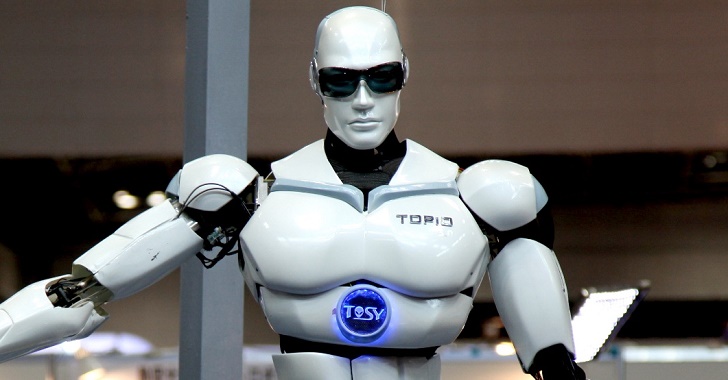First, let me define my terms. When I use the word ‘robot,’ I am not referring only to automated machines or cybernetic androids. For the purposes of this article, ‘robot’ will refer to any artificially created entity or interface that is endowed with a high level of sentience and intelligence. A great example of this in popular culture is the operating system Samantha from the Spike Jonze film, Her, though this character is better utilized as a lens through which to assess the emotional dimensions of artificial intelligence.
By invoking robots, I am primarily referring to artificial intelligence. To be sure, artificial intelligence already exists. It just doesn’t look like what science fiction prognosticators of previous decades originally envisioned. Anytime you type into the Google search bar and the field is auto-populated with suggestions, that is an example of algorithmic artificial intelligence. Anytime Siri responds to one of your absurdly facetious questions (or legitimate queries), you are witnessing an embryonic form of artificial intelligence. We take it for granted, but these are extraordinary advances that would be have seemed impossible to previous generations.
In the future, the evolution of artificial intelligence will be so dramatic and rapid that we will scarcely be able to identify the point at which strong artificial intelligence surpasses human cognition, although some would argue that has already happened. Already, innovations like IBM’s Watson are surpassing the limits of human intelligence and, in the case of a computer program called Eugene Goostman, passing the Turing Test with flying colors.
My purpose here is not to assess the evolution of artificial intelligence or even speculate on its future. For aspects of the latter, see my previous article for Anti-Media. In the current article, I want to pose and answer a specific question: will robots and artificial intelligence entities of the future have more rights than flesh and blood humans? On its face, this is a specious question, riddled with esoteric trapdoors and loopholes. For one, human rights is already an emotionally complex and legally obtuse topic. Human rights violations are rampant and even in the world’s most democratized, ostensibly benevolent societies, entire classes of humans lack basic rights, which in my opinion include healthcare, education, food, and water.
 In modern times, the primary reason for this continued dearth of human rights is the power of oligarchy, plutocracy, and corporatocracy. Wealth and corporate power trump individual human rights. The best example of this being codified into law is the Supreme Court decision, Citizens United. Another major looming manifestation of corporate rights superseding human rights is the Trans-Pacific Partnership (TPP), the unprecedentedly secretive trade agreement by which international corporate tribunals will be able to overrule the laws of national legislatures.
In modern times, the primary reason for this continued dearth of human rights is the power of oligarchy, plutocracy, and corporatocracy. Wealth and corporate power trump individual human rights. The best example of this being codified into law is the Supreme Court decision, Citizens United. Another major looming manifestation of corporate rights superseding human rights is the Trans-Pacific Partnership (TPP), the unprecedentedly secretive trade agreement by which international corporate tribunals will be able to overrule the laws of national legislatures.
Let’s return to the issue of robot rights, or the rights of sentient beings. It is my belief that initially robots will have no rights and the very idea will be laughed at. That’s because the first few generations of weak artificial intelligence robots will not approximate human likeness. Currently, this is known as the ‘uncanny valley,’ whereby something seems eerily close to human, such as the face of a robot sex doll, but feels wrong for some inexplicable reason (perhaps the fact that it’s a robot sex doll).
However, when artificial intelligence advances to even the early stages of the evolutionary paradigm shift Ray Kurzweil describes in The Singularity Is Near, our ideas about what it is to be human and what constitutes intelligence will be forever altered. This will be further complicated by humans upgrading their own bodies and minds with cybernetic tools and transhumanist technologies. Such advances will blur the line between biological and artificial intelligence.
Within the next few decades, humans will almost certainly be augmenting themselves with AI and we will see many cases in which the AI is used as a defense for a wide variety of crimes. Conversely, strong AI will eventually issue counter lawsuits against humans who they deem are demeaning and besmirching the name of artificial intelligence (presumably after dismantling ‘artificial intelligence’ itself as moniker in favor of something more like ‘sentient beings’).
In an article entitled “Law Professors Argue Future Plausibility Of Robots Earning Free Speech Rights,” two law professors ponder the future First Amendment rights of strong artificial intelligence.
This little device delivers turnkey Internet privacy and security (Ad)
They present a hypothetical case that illuminates the complexities of the subject:
Imagine, for example, a Supreme Court case called Robots United that involves a First Amendment challenge to the government’s regulation of speech by a robot with strong AI, where the regulation restricts speech on a matter of public concern based on the expression’s content and its speaker’s identity. Judy Jetson — a former Solicitor General of the United States now representing private parties — is the robot’s lawyer and argues that the robot itself has free speech rights. Nobody in the courtroom laughs out loud, though some remain skeptical. The justices realize that precedent already affords free speech protection to the speech of artificial entities as well as to those who lack fully mature autonomous capacity. Indeed, the case law hinges more on pragmatism and on expression’s informational value than on any philosophical purity about speaker personhood or rights. This audience focused perspective may lead the Court to a remarkable conclusion: speaker humanness may be a sufficient but not logically essential part of its theoretical and doctrinal constitutional calculus. Judy Jetson and her robot client may prevail.
Ultimately, the professors conclude that strong artificial intelligence will be granted First Amendment constitutional rights of personhood. It is this word, personhood, on which my argument hinges, as in the last couple decades we have seen the nature of this word change — but not by a revolution of artificial intelligence or robots, but rather by globalist coup, spearheaded by multinational corporations. Thus far, it is corporate personhood that has changed the nature of humanity, not robots, though automation is no doubt irrevocably altering the global economy.
 To extrapolate even further, strong artificial intelligence, at least initially, is almost certain to be proprietary property owned by both corporations and governments. If Citizens United serves as any example, corporatized entities created by humans can have just as many legal rights as biological flesh and blood humans. And these rights are emboldened and strengthened by the extraordinary wealth corporations wield and the power this grants them over lawmakers and, as a result, the rights of individual humans.
To extrapolate even further, strong artificial intelligence, at least initially, is almost certain to be proprietary property owned by both corporations and governments. If Citizens United serves as any example, corporatized entities created by humans can have just as many legal rights as biological flesh and blood humans. And these rights are emboldened and strengthened by the extraordinary wealth corporations wield and the power this grants them over lawmakers and, as a result, the rights of individual humans.
To throw an incendiary hypothetical question your way: who is more likely to face criminal charges, a cop who vandalizes a Google office, steals sensitive information and sells it to hackers… or a cop who guns down a black man? I submit to you that the answer is the former.
In the future, the question may change to whether it is murder to shoot a sentient Amazon delivery drone out of the sky (or a sentient military drone). I submit to you that it will be and that corporate and government-owned artificial intelligence robots will enjoy more secure human rights than humans themselves — because with AI, there will be money, proprietary source code, brand recognition, and possibly national security information on the line and these are demonstrably more important to the powers that be than human rights.
In a world in which machine automation is slowly but surely taking over the human workforce and corporations continue to consolidate unprecedented global control, I can’t reach any other conclusion but that in the near future working-class humans will rarely live as anything more than indentured servants, peasants in a new feudal order of corporate AI.
Happy New Year!
This article (Soon Robots Will Have More Rights than Humans) is free and open source. You have permission to republish this article under a Creative Commons license with attribution to Jake Anderson and theAntiMedia.org. Anti-Media Radio airs weeknights at 11pm Eastern/8pm Pacific. Image credit: Humanrobo. If you spot a typo, email edits@theantimedia.org.


I have written extensively about this. My fourth novel (“The Chronicles of Vesna”, Cydonia Publishing) is due out this April. Vesna (the Slavic word for the season Spring) is an AI is the perpetual bane of her inventor throughout three related stories. I taught AI at University in Kentucky 30 years ago and the writing was already on the wall, only the hardware was lacking to handle the types of input required.
The concept came into existence in 1921 in R.U.R. (Karel Čapek’s “Rossumovi Univerzální Roboti” (Rossum’s Universal Robots)) Robot is the Slavic word meaning “worker”.,
Like most lifeforms if robots become conscious they’ll develop a survival instinct and maybe an enhanced survival instinct, and the people most dangerous to them are the people who commission them and can put them back in the box. It’s the elite who will surely be their first target not us hoi polloi. Those without power could hardly threaten them and our manual dexterity and thought processes may even be useful.